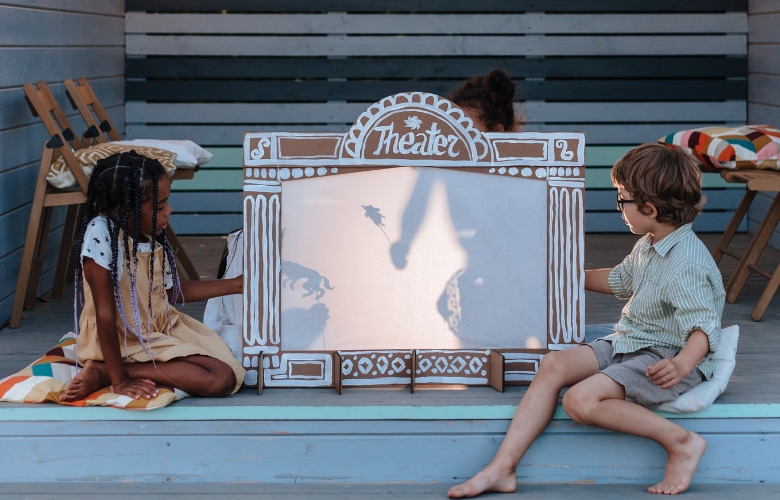Every Child Should Take an Acting Class: 10 Reasons

Like sports, being involved in acting in elementary school does not mean that a child will go on to make a career out of their hobby. They may even stop playing before middle school JV begins. As an educator, every parent I speak with wants their child to be involved in some kind of team sport, but many are balk when I tell them that theatre is the best team sport there is. Here are 10 reasons why every child should take an acting class.
It has been only in adulthood that I’ve come to realize and appreciate all of the gifts acting classes gave to me; all the lessons I was taught which I carry with me now, two decades later, into nearly every aspect of my adult life.
1. Acting teaches reading comprehension.
When a child is asked to perform, they are being asked to not only understand the pronunciation of vocabulary on the page, but also the reason that a character would say those words. Understanding a character’s words and actions is a sign of a highly proficient reader.
2. Theatre is about process.
In sports, children often hear the refrain that it “doesn’t matter how practice feels, as long as they win the game.” Theatre teaches students that the process of rehearsal is more important than the final product. Children who learn this lesson grow into adults who have high social-emotional intelligence skills.
3. Being a part of a play teaches students the art of losing well.
Every child wants to play Cinderella or Prince Charming. Alas, there are only so many leading roles in a play; being cast in the ensemble teaches children that they are an integral part of a process, even if they didn’t get the part they originally wanted. Learning the art of losing well in childhood creates strong and resilient adults, ready to bounce-back from any setback or roadblock in their way.
4. Getting on stage in front of strangers is hard and scary!
Stage fright can most easily be tackled when children are still young. Acting offers the lesson that everyone is capable of doing hard and uncomfortable things. Years later, the experience of getting on stage in elementary school can translate to having confidence giving oral presentations in debate class, defending a dissertation, or speaking at public events.
5. If you have any adult friends who are always afraid of “looking silly,” I bet you they didn’t take an improv class in grade school.
Teaching theatre teaches children about radical silliness and the importance of play. Children who are comfortable being silly become adults who know that making a mistake is a learning lesson, not the end of the world.
6. Compassion and empathy.
Theatre allows actors and audience a glimpse into a world unlike their own. Performing in a play forces you to put yourself in someone else’s shoes. Learning to do so teaches empathy and compassion on a global level, in ways that cannot be imagined or learned inside of a classroom or from reading a social story.
7. How to prepare well.
When I started doing theatre, my bedtime routine with my mom changed to include reviewing my lines for the play I was a part of. I learned at an early age what tools and scaffolds I needed in place to prepare well. As an adult, I am keenly aware of how I learn; knowing how I learn means I am capable of learning just about anything.
8. It is no secret that children who read more have higher fluency in writing as well.
When a child is given plays to read, they learn how to write about actions and feelings. A highly skilled writer has an easier time working in a job where any sort of writing is required.
9. Social skills.
Working with a large cast of a play helps teach children how to get along well with others. Children who learn how to appropriately interact with others often grow into adults who can adapt to changing social circles (like when one moves away to college or lands their first job in the “big city”).
10. Managing priorities.
Being a part of a play is a big commitment. Add school on top of that and sometimes sacrifices must be made like not going to your neighbor’s pool party or your cousin’s birthday bash. Working with a group of people to accomplish a task requires individual ownership and group accountability. As a teacher who is also in graduate school. Learning to manage priorities means that I know what is important enough to say “yes” to, and what events are best left for next time.
The reality is this: your child may not be a very good actor! Just like they may not be the fastest runner or best quarterback on the field. Regardless of the level of success children have doing these activities, the lessons they can learn along the way create confident and capable adults.
Editor's Note: At StageLync, an international platform for the performing arts, we celebrate the diversity of our writers' backgrounds. We recognize and support their choice to use either American or British English in their articles, respecting their individual preferences and origins. This policy allows us to embrace a wide range of linguistic expressions, enriching our content and reflecting the global nature of our community.
🎧 Join us on the StageLync Podcast for inspiring stories from the world of performing arts! Tune in to hear from the creative minds who bring magic to life, both onstage and behind the scenes. 🎙️ 👉 Listen now!
